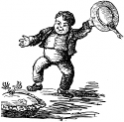Work my ticket
Waddya mean there’s no merit badge for watching Mister Ed?
Dear Word Detective: I have a friend involved with the Wood Badge program in Boy Scouts, and a popular phrase they use is “Working my Ticket,” by which they mean earning the Badge. The question is, what is the actual meaning of the original use of this term? The term came to the US branch of Boy Scouts through the song “Back to Gilwell,” which Lord Baden Powell included in his early adult training program. Supposedly, BP got the song (and phrase) from the British Army, and that the term refers to an era when British soldiers serving overseas had to earn their own fare back to England upon discharge. In their interpretation, “Working my Ticket” connotes hard work towards a worthy goal. However, every time I’ve seen the term, it is a euphemism for goofing off, seeking a fraudulent discharge or even living off welfare/charity. In fact, I recently saw it defined in a military slang dictionary as “being a slacker.” I suspect the original meaning of this British Army term has been lost and reinvented in a more worthy form. What was its original meaning? — Chuck Herrick.
 Thanks for an interesting question. It takes me back to my halcyon days in the Cub Scouts, which, as I recall, totaled about five. As soon as I realized that they were serious about that “sleeping outdoors” stuff, I was history.
Thanks for an interesting question. It takes me back to my halcyon days in the Cub Scouts, which, as I recall, totaled about five. As soon as I realized that they were serious about that “sleeping outdoors” stuff, I was history.
I looked up the lyrics to “Back to Gilwell,” which begin:
I used to be a Beaver, And a good old Beaver too, But now I’ve finished Beavering, I don’t know what to do, I’m growing old and feeble, And I can Beaver no more, So I’m going to work my ticket if I can. (chorus) Back to Gilwell, happy land, I’m going to work my ticket if I can.
Gilwell Park, outside London, is where Sir Robert Baden-Powell, founder of the international Scouting movement, established the first scoutmaster’s training camp in 1919, and apparently the place is infested with beavers. Just kidding; as the song proceeds, it cycles through various Scout patrol names (Eagle, Fox, Owl, etc.).
Baden-Powell was a retired General of the British Army, so he certainly had encountered armed services slang, but I’m beginning to wonder how well he understood what he heard. “Working one’s ticket” was, as of the late 1890s, British Army slang for “obtaining one’s discharge papers by claiming (or feigning) a physical disability” (“It is a comparatively easy matter for a discontented man to ‘work his ticket’,” H. Wyndham, The Queen’s Service, 1899). “To get one’s ticket” was to be discharged in the normal way, the “ticket” being a certificate of discharge, not a ticket home. “To work one’s ticket” is apparently still current slang in Britain for “to gain an advantage by malingering or fraud.”
So, was “Back to Gilwell” an attempt to redefine “work one’s ticket” in a positive direction? Or has the song been misinterpreted, and the Old Scout actually angling for a chance to goof off back at base camp? Beats me, but to most folks outside of scouting, “to work one’s ticket” is the polar opposite of hard work. If the Scouts manage to change that meaning in popular use, they deserve a Usage Badge with an oak cluster.
Page 1 of 2 | Next page
